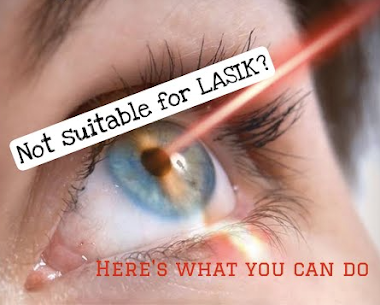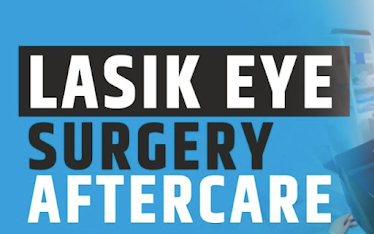Who is not suitable for laser eye surgery?
Laser eye surgery has transformed the lives of millions by offering improved vision without the need for glasses or contact lenses. Having said that, it is only appropriate for a select few.
Laser Eye Surgery: Understanding Who may not be suitable and Why
Let's explore who may not be suitable candidates for laser eye surgery and the reasons behind it. Understanding these limitations is important to ensure the best possible outcomes for individuals considering this life-changing procedure.
Unstable Vision Prescription
Individuals with an unstable vision prescription, characterized by frequent changes in their prescription, may not be suitable for laser eye surgery. The surgery aims to correct vision based on a stable prescription.
Those experiencing fluctuations in their vision may require additional time for their prescription to stabilize before considering the procedure. Ensuring that the eyes have reached a consistent refractive state is essential to achieve optimal results.
Age and Eye Development
Laser eye surgery is typically recommended for individuals above 18, as the eyes tend to stabilize in early adulthood. Younger individuals may still be undergoing natural changes in their eye development, which could affect the long-term effectiveness of the surgery.
Additionally, older individuals may experience age-related eye conditions, such as cataracts or glaucoma, requiring different treatments. A comprehensive eye examination and consultation with an ophthalmologist can determine the most appropriate timing for laser eye surgery based on individual circumstances.
Eye Health and Medical Conditions
Certain eye health conditions, such as severe dry eye syndrome, keratoconus, or corneal diseases, may make individuals unsuitable candidates for laser eye surgery. These conditions can affect the cornea's stability and healing process, compromising the procedure's success.
Additionally, individuals with underlying medical conditions, such as diabetes or autoimmune disorders, may have reduced healing capabilities, increasing the risk of complications. It is crucial to disclose all medical history and existing eye conditions to the ophthalmologist during the consultation to determine the suitability for the surgery.
Pregnancy and Nursing
Pregnant women or those who are currently nursing are generally advised to postpone laser eye surgery. Hormonal changes during pregnancy can cause temporary fluctuations in vision, and breastfeeding mothers may experience changes in their eye prescription.
Opting for surgery when hormonal levels have stabilized and vision has returned to its pre-pregnancy state is recommended to achieve accurate and long-lasting results.
While laser eye surgery has revolutionized vision correction, it is important to recognize that only some are suitable candidates. Factors such as unstable vision prescription, age, eye development, existing eye health conditions, and pregnancy/nursing status may influence the suitability for the procedure.
Consulting with an experienced ophthalmologist and undergoing a comprehensive eye examination are crucial steps to determine individual eligibility. Understanding who may not be suitable for laser eye surgery helps ensure that individuals receive the best possible care and achieve optimal outcomes for their visual needs.
Some people who are not eligible for LASIK or prefer to avoid it have valid reasons for their decision. Some individuals may prefer non-invasive options like eyeglasses or contact lenses, finding them more familiar and comfortable.
Though low, concerns about potential risks and complications can also influence their decision to explore alternative methods of vision correction. Lifestyle and career considerations, such as participation in contact sports or demanding professions, may prompt individuals to opt for options that offer flexibility and ease of use.
Respecting and supporting these choices is crucial by providing information and guidance on alternative vision correction options that align with their preferences and needs. Ultimately, understanding and appreciating individual decisions ensures that everyone receives appropriate and effective vision correction solutions.
Alternatives to Laser Eye Surgery: Embracing Vision Correction Options
Laser eye surgery is a popular and effective procedure for vision correction, but it may only be suitable for some. For those deemed unsuitable candidates for the surgery, alternative options are available. So let us explore what individuals should consider if they are unsuitable for laser eye surgery and why these alternatives can still provide excellent vision correction results.
Eyeglasses: A Classic Choice
For individuals unsuitable for laser eye surgery, eyeglasses remain a reliable and time-tested option for vision correction. Eyeglasses come in various styles and lens options, allowing individuals to express their style while enjoying clear and comfortable vision.
With advancements in lens technology, eyeglasses can now provide high-definition vision, anti-glare coatings, and lightweight materials for enhanced comfort. Regular eye examinations ensure the eyeglass prescription is current and accurately meets the individual's visual needs.
Contact Lenses: Freedom from Glasses
Contact lenses offer an alternative to glasses, providing a natural appearance and a wider field of vision. Many individuals find contact lenses comfortable and convenient for their active lifestyles.
Various types of contact lenses are available, including daily disposables, extended-wear lenses, and specialized lenses for astigmatism or presbyopia. Following proper hygiene practices and having regular check-ups with an eye care professional is crucial to ensure optimal eye health when using contact lenses.
Orthokeratology (Ortho-K): Overnight Vision Correction
Orthokeratology, or Ortho-K, involves wearing specialized gas-permeable contact lenses overnight to reshape the cornea temporarily. This non-surgical procedure offers vision correction without needing glasses or daytime contact lenses.
Ortho-K lenses are worn during sleep, gently reshaping the cornea, and are removed upon waking, providing clear vision throughout the day. This option suits individuals with mild to moderate myopia (nearsightedness). Regular follow-ups and lens replacements are necessary to maintain the desired vision correction.
Refractive Lens Exchange (RLE) and Implantable Contact Lenses (ICL): Surgical Alternatives
For individuals with severe refractive errors or those who are not suitable candidates for laser eye surgery, refractive lens exchange (RLE) and implantable contact lenses (ICL) are surgical alternatives. RLE involves replacing the eye's natural lens with an artificial intraocular lens (IOL) to correct vision.
ICL, on the other hand, involves implanting a specialized contact lens inside the eye. Both procedures provide excellent vision correction outcomes but require surgical intervention and careful consideration.
While laser eye surgery may not suit everyone, alternative options are available to achieve clear and comfortable vision. Eyeglasses, contact lenses, orthokeratology, refractive lens exchange (RLE), and implantable contact lenses (ICL) offer effective solutions for individuals who are not suitable candidates for laser eye surgery.
By consulting with an experienced eye care professional, individuals can explore these alternatives and choose the option that best meets their specific vision correction needs, allowing them to enjoy clear vision and improved quality of life.



Now, Lasik has become advanced with Wavelight Plus InnvoEyes techonlogy.
ReplyDelete